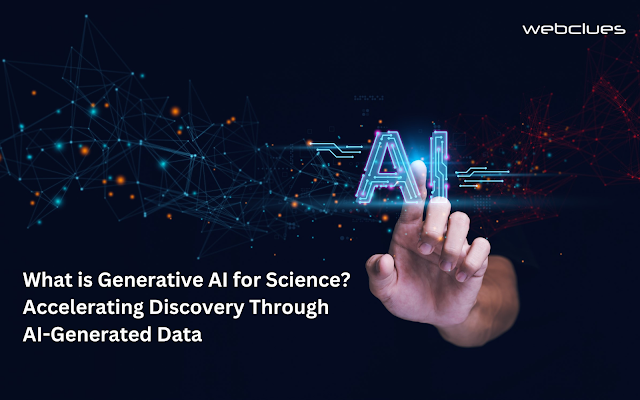What is Generative AI for Science? At its essence, it harnesses the computational prowess of deep learning algorithms to fabricate synthetic data, which closely mirrors the statistical properties and structural intricacies of authentic datasets. This transformative process unfolds through meticulous training of machine learning models on extensive repositories of existing data, spanning diverse domains such as genomics, climate science, drug discovery, and beyond. Through this iterative learning process, these models acquire an intricate understanding of the underlying patterns and correlations embedded within the data, enabling them to generate novel data points with remarkable fidelity.
Generative AI for Science surmounts the perennial challenge of data scarcity and experimental constraints that often impede scientific progress. In domains characterized by arduous data collection processes or inherent limitations in experimental methodologies, such as genomics or climate science, the generation of synthetic data offers a lifeline to researchers. By producing synthetic genomic sequences, climatic simulations, or virtual compounds, Generative AI augments existing datasets, furnishing researchers with an expansive reservoir of data for analysis and exploration.
Moreover, Generative AI facilitates the simulation of hypothetical scenarios and the emulation of intricate systems that may elude empirical investigation. In disciplines like climate science, where forecasting the repercussions of environmental changes is paramount, generative models serve as invaluable tools for predicting diverse climate scenarios and unraveling the intricacies of complex climatic phenomena. By generating synthetic climate data, scientists can scrutinize the sensitivity of climate models to various parameters, refine predictive algorithms, and enhance the accuracy of long-term climate projections.
The realm of drug discovery and materials science stands to reap substantial benefits from what is Generative AI, as well. By fabricating virtual compounds and molecular structures, researchers can expedite the process of screening potential drug candidates and identifying novel materials with tailored properties. This transformative approach not only accelerates the pace of drug discovery but also mitigates the exorbitant costs and resource-intensive nature of experimental drug development.
Furthermore, Generative AI serves as a potent catalyst for data augmentation, a pivotal technique aimed at enhancing the diversity and robustness of machine learning models. In domains like medical imaging, where access to annotated datasets is often limited, the generation of synthetic data enables researchers to circumvent data scarcity and bolster the generalization capabilities of their models. By synthesizing realistic data samples, Generative AI mitigates the risk of overfitting and enhances the efficacy of machine learning algorithms in diagnostic and prognostic tasks.
While the potential of Generative AI for Science is undeniably transformative, it is not without its challenges and ethical considerations. Ensuring the veracity and reliability of synthetic data necessitates rigorous validation and verification processes to safeguard against biases or artifacts that may skew research outcomes. Moreover, the ethical implications of leveraging AI-generated data in scientific research demand careful scrutiny, particularly concerning issues of privacy, consent, and the inadvertent perpetuation of biases present in the training data.
In conclusion, Generative AI for Science heralds a new era of scientific inquiry, characterized by unparalleled innovation and accelerated discovery. By harnessing the generative capabilities of artificial intelligence, researchers can transcend the constraints of traditional data acquisition methodologies, unlock novel insights, and propel scientific progress to unprecedented heights. However, realizing the full potential of What is Generative AI necessitates a concerted effort to address technical challenges, ensure data integrity, and navigate the ethical complexities inherent in its application. With steadfast commitment and interdisciplinary collaboration, Generative AI has the potential to revolutionize scientific research and shape the future of knowledge creation. Contact WebClues Infotech to learn more about our generative AI solutions.


0 Comments